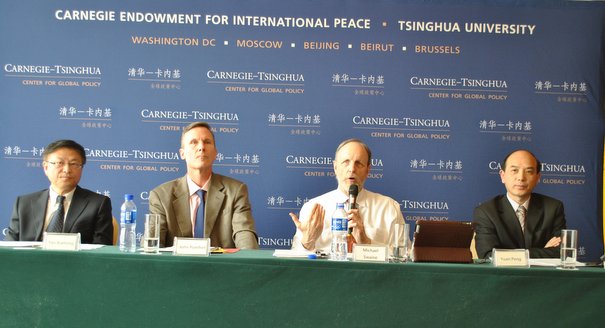Registration
You will receive an email confirming your registration.
IMGXYZ3733IMGZYXThe U.S. pivot to the Asia-Pacific has created both tension and opportunity in its relations with China. It demonstrates that the United State is serious about Asia, which provides reassurance to many Asian nations while worrying China. Michael Swaine, senior associate of the Carnegie’s Asia Program, discusses the future of Asia-Pacific regional policy in his book, America’s Challenge: Engaging a Rising China in the Twenty-First Century.
For the Beijing launch of his book, Swaine was joined by Carnegie-Tsinghua’s Yan Xuetong and Yuan Peng, Director of the China Institute for Contemporary International Relations’ Institute of American Relations to discuss China as a rising power. Carnegie-Tsinghua Director Paul Haenle opened the forum and John Pomfret, former Washington Post bureau chief, moderated the discussion.
Sustaining U.S. Influence in the Asia-Pacific
Swaine stated the United States is focused on engaging China through maximizing cooperation and further integrating China into the international system. However, he warned that the United States must prepare for an uncooperative China in order to maintain its influence in the Asia-Pacific.
Swaine described three possible strategies for the United States to engage China while sustaining its influence in the Asia-Pacific region:
- Selective Engagement: During the last decade, the United States has primarily focused on the Middle East. The announcement of the U.S. pivot to Asia marks the United States actively shifting its focus from the Middle East to the Asia Pacific. Swaine argues that this remobilization of resources toward the Asia-Pacific is selective engagement.
- Off-shore Balancing: Using its military and naval presence, the United States strategically engages with a selected number of nations in the Asia-Pacific. This allows the United States to both assert its influence while balancing China’s. However, off-shore balancing is unpredictable, as it may undermine and threaten the Chinese government.
- Cooperative Security Framework: Swaine proposed a cooperative security framework where countries can cooperate to share security responsibilities between the United States and China, providing stability for both nations. However, before a framework can be conceived, the United States and China would first need to agree that such a framework is needed. Both Yan Xuetong and Yuan Peng agreed that this would be the best strategy. However, the current conflicts over nuclear power, technological disparities, and territorial disputes may hinder developing such a framework.
Three Strategic Questions
Swaine outlined three main questions the United States must consider:
- Does the United States have the capability to meet its security needs?
- Can the United States accept an alternative to U.S. prominence in the Asia-Pacific?
- What measures would push Chinese leaders to accept U.S. prominence in the Asia-Pacific? Or, how could the two nations create a security cooperative framework to share responsibilities?
China’s Status as a Global Power
- United States Reaching Limits of Power: Swaine pointed out that after the 2008 economic crisis, the United States had reached the limits of its leadership, especially in regards to its naval capabilities. However, the U.S. pivot toward Asia has placed the pressure on the United States to increase military presence in nations like South Korea, Japan, India, and Australia.
- China Not a Superpower: In response to the growing argument that the global order was moving from a unipolar system (centered on the United States) to a bipolar one (centered on both the United States and China), Yan emphasized that the Chinese themselves do not believe that China is a superpower. Citing China’s domestic development and GDP, Yan explained that China is not a superpower and has no ambitions to become one.
- Growing Resistance to U.S. Influence: Chinese suspicion of growing U.S. influence in China and Asia is due to the perceived focus on democratization. Swaine disagreed with the idea that the U.S. foreign policy should aim to to democratize China. This would only create a set of expectations and suspicions that are unnecessary and unrealistic, he concluded.
Maintaining Positive Relations
The United States and China have, to a limited degree, sustained cooperation on economic issues, the prevention of nuclear proliferation, technology, and international crises. Both nations have also stated that they wish to move away from a Cold War mentality, and both have managed to keep tensions from escalating into armed conflict—for example, over the Taiwan Strait crisis. Despite increased tensions over recent issues such as Syria, Iran, and the South China Sea, as well as U.S. arms sales to Taiwan, hope still remains for further cooperation, panelists concluded.
